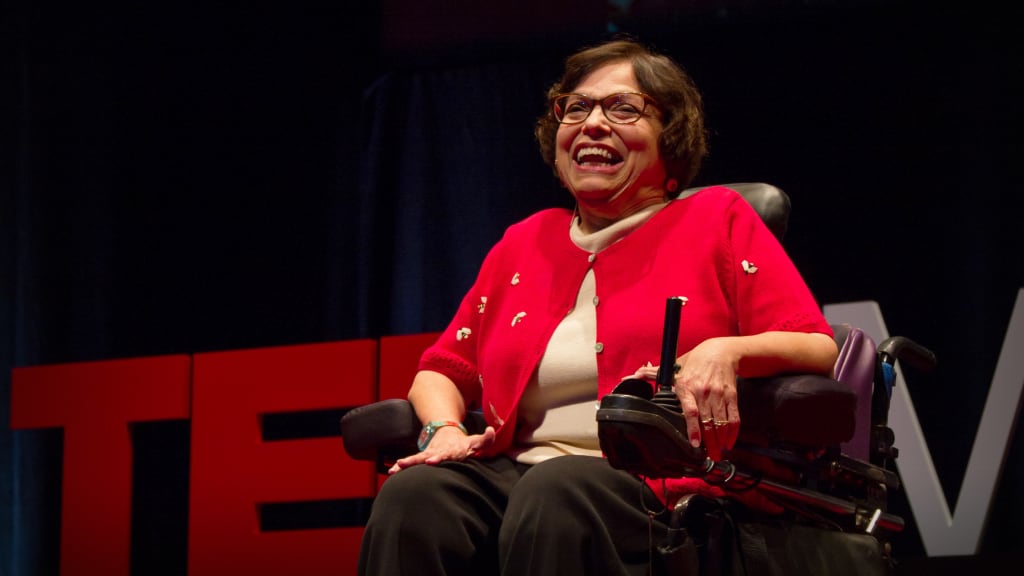I Wish I Had Known You Sooner
A Letter to Judy Heumann

"How many people does it take to stop a bus in New York City when they refuse to let you on because you're in a wheelchair? One.”
- Judy Heumann | TED Talk
Dear Judy Heumann,
I wish I had known you sooner. I’ve written “known” when the phrase “known about” might be more apt. I do not know you; not really. I do not know you in the way I know my friends; I don't know your favorite kind of music, what you enjoy drinking on a Sunday morning, or even the city in which you currently reside. The things I do know about you have been mentally stitched together from different sources, which I have read and watched, over the past few years. Your novel: Being Heumann: An Unrepentant Memoir of a Disability Rights Activist. The phenomenal movie, Crip Camp: A Disability Revolution, which is currently nominated for an Oscar. Your TED Talk, Our Fight for Disability Rights, and Why We’re Not Done Yet. The raw footage of you making your voice heard, during the 504 Sit-In, as well as the hilarious reenactment via Drunk History. While I don’t personally know you, I know the exact way that your voice emotionally cracked when you told a panel of nondisabled men: “I would appreciate it if you would stop shaking your head in agreement when I don't think you understand what we are talking about." I know this emotion. I know this pain, inflicted by an ableist and disablist society. I know what it’s like to try to fight for change, in a world that remains stubbornly stagnant. I have known all of this, since I was a disabled child, which is why I reiterate: I wish I had known you sooner.
Though I knew what it was like to face these obstacles, as a child, I faced them alone. I had no disabled role models. I knew none. It wasn’t until I willingly chose to tip my wheelchair over the edge of the crevice and dive into the chasm of advocacy, that I knew your name and your story. At the age of twenty-six, I now know that there was a generation of fighters, who looked like me, who sounded like me, who moved like me, who fought for the world in which I grew up. I know what you did to change laws, minds, and stigmas. I know the name ‘Judy Heumann’. I know the name ‘Kitty Cone’, whose contributions to disability rights were recently featured in a brilliant New York Times article. I know the name ‘Stella Young’, and quote her powerful TED Talk at least once a day. I know the name ‘Jennifer Keelan-Chaffins', and the picture-book in which her story is featured. I know the name ‘Senator Tammy Duckworth’, whose own story is about to be released. I know these names. These names, these people, are my role models. Yet, they are role models who I learned about in my twenties.
Growing up, my Rural New York school district never taught us about the Sit-Ins that advocated for the signing of Section 504 of the Rehabilitation Act, nor did they teach us about the Capitol Crawl that advocated for the signing of the Americans with Disabilities Act. Come to think of it, I’m not entirely sure that my school district knew what Section 504 and the ADA were, let alone the disabled women who advocated for these laws. That last sentence is meant to be sardonic. Perhaps it’s a bit harsh. They knew about the laws that protected disabled people. I’m just not sure they knew about the disabled people, period.
Reflecting on the years when I was an Early Childhood Education Major (I have since moved on to advocating for students in higher education and I'm currently pursuing my Ph.D. in Disability Studies), I am filled with regret over the vast number of things that I never taught my students. Granted, one would have to think creatively to teach a group of preschoolers about the Capitol Crawl, but I used to have to think just as creatively to teach them about dinosaur eggs. (I would have absolutely taken them to a staircase, we would have absolutely crawled, and it would have been absolutely adorable.) So, why didn’t I teach my students about these concepts, even in a creative, introductory, way? I didn’t know about the concepts, at the time! I couldn’t teach what I didn’t know. Had my teachers taught me about these amazing disabled women, and their journeys, I would have been able to pass the information onto my own students. As is, my teachers most certainly didn’t know about these names. In their defense, disability history wasn’t as broadly shared, as it is in modernity. There were no TED Talks, no Oscar-nominated documentaries, no colorful picture-books. The only time I ever learned about a disabled woman was in an overly-saccharine short about Helen Keller, on PBS Kids. I’d share the link but my aim isn’t to torture, it’s to teach.
Ms. Heumann, I know that you had the same aim—the aim to teach—when you fought for your teaching license, after being initially denied for ableist and disablist reasons. Teaching is the most fundamental way that we can share the lived-experiences, and the people who lived them, from one generation to the next. It’s my sincerest hope that today’s children will grow up learning about these disabled women. In doing so, disabled children, and indeed all children, will be able to develop role models, before they’re in their twenties.
Sincerely,
Burgandi Rakoska
About the Creator
Burgandi Rakoska
Burgandi Rakoska is a disabled author who is currently undertaking a PhD at the University of Leeds, having graduated from Columbia University, Teachers College. Burgandi writes disability representation like she's running out of time...






Comments
There are no comments for this story
Be the first to respond and start the conversation.